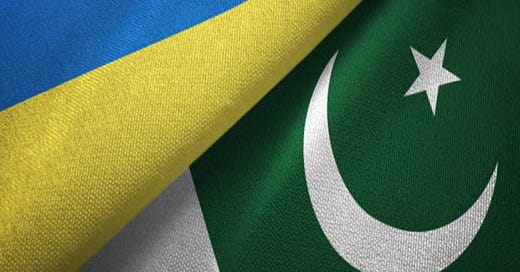One way or another, the Kremlin must make its displeasure with Islamabad known, but in a way that doesn’t risk Pakistan overreacting by throwing caution to the wind and doubling down on its indirect armed drone exports to Ukraine out of spite.
A popular military blog drew attention the other day to a viral thread analyzing one of the Ukrainian drones that was recently downed in Russia’s Belgorod Region, which compellingly argues that the munition came from Pakistan and was exported Ukraine via Turkiye. They discovered that a very similar looking one is proudly showcased in Pakistan’s National Aerospace Science and Technology Park, and since it has an agreement with Turkiye’s Baykar, the latter possibly passed it along to Kiev.
As the thread’s author concluded, “a drone assembled in Pakistan, in collaboration with Türkiye, was sent to Ukraine, filled with explosives and then flown into Russia. One can consider the geopolitical implications. As a complication, Baykar is also working with Ukraine.” In other words, Pakistan has ramped up its contribution to NATO’s proxy war on Russia through Ukraine, likely as a quid pro quo for more IMF aid per The Intercept’s report from August about why it was sending ammo there at the time.
The geopolitical implications are enormous since they confirm that the aforesaid report wasn’t just an opportunistic one-off carried out by an economically desperate regime like some have suggested, but the beginning of a comprehensive proxy war partnership that proves Pakistan’s return to US vassalage. It’ll also probably ruin the new Russian and Pakistani Ambassadors’ shared vision of strengthening bilateral ties since Moscow might not feel comfortable doing so anymore after what Islamabad just did.
In fact, it could even scale ties back a bit in response, albeit in a “plausibly deniable” way per Russia’s commitment to classical diplomatic traditions. For instance, long-running and thus-far mostly futile talks with Pakistan over large-scale Russian energy exports could be informally suspended on the pretext that nothing came of them. After all, there’s a better use for its negotiators’ limited time than to keep clinging to the hope of reaching a deal with Islamabad, and finite resources could be better expended elsewhere.
Socio-cultural cooperation and Russian agricultural exports are expected to continue since they’re apolitical, but anything with a strategic tint to it like the previously mentioned energy talks and the small arms trade could be curtailed, the latter on the pretext of meeting pressing domestic needs. Not reacting in any tangible way, even a “plausibly deniable” one, would risk reflecting poorly on Russia’s international reputation and therefore isn’t advised.
One way or another, the Kremlin must make its displeasure with Islamabad known, but in a way that doesn’t risk Pakistan overreacting by throwing caution to the wind and doubling down on its indirect armed drone exports to Ukraine out of spite. Even that worst-case scenario won’t make any difference in terms of changing the conflict’s dynamics, but it could dangerously return those two back to their fierce Old Cold War-era rivalry, which would destabilize Greater Eurasian dynamics.




